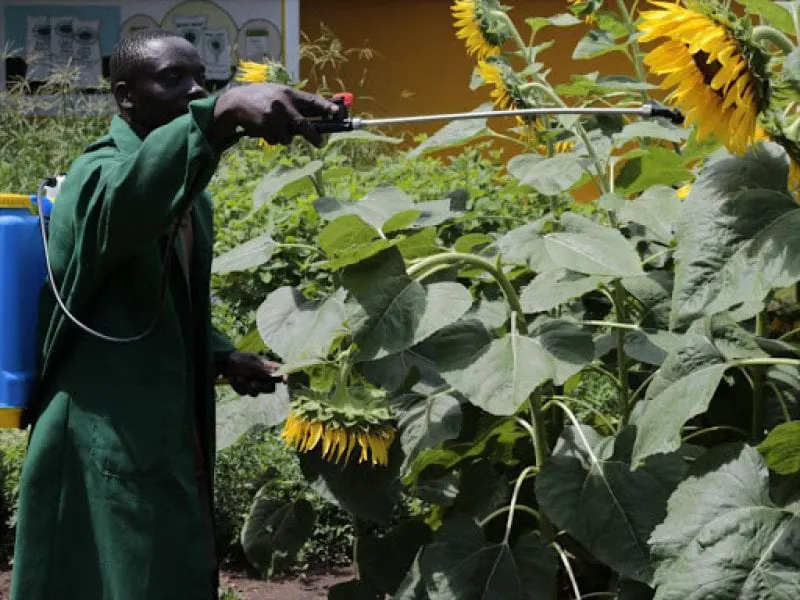Viewpoint: If Kenya relents to activist pressure and bans pesticides, coffee, maize and wheat farmers could lose up to 90% of crops
Viewpoint: If Kenya relents to activist pressure and bans pesticides, coffee, maize and wheat farmers could lose up to 90% of crops


Coffee, maize and wheat farmers could suffer up to 90 per cent in yield losses if the government bans popular pesticide ingredients as demanded by activists.
An independent study by Egerton University’s Tegemeo Institute shows, for instance, that farmers will have almost nothing to control the coffee berry borer.
The pest can cause between 50 and 90 per cent harvest losses if uncontrolled.
“The proposed ban on agrochemical has adverse effects on food security, incomes and the economy. It does not guarantee food safety,” said Timothy Njagi, a senior researcher at the Egerton-based Tegemeo Institute of Research and Policy.
The ban of at least 200 chemicals used locally is recommended in a bill sponsored by Uasin Gishu Woman Representative Gladys Boss Shollei.
…
In total, Njagi said the country could lose more than Sh150 billion [~1.33 billion USD] if the ban is put in place.
He said the country would lose an equivalent of 16 percent of the gross domestic product.
The regulator, Pest Control Products Board, said it has stringent ways of vetting pesticides used in Kenya.
[Registration Officer Paul] Ngaruiya said PCPB also works to ensure that counterfeits, expired, unregistered and substandard pest control products are removed from the market.This is an excerpt. Read the original post here.

 | Videos | More... |

Video: Nuclear energy will destroy us? Global warming is an existential threat? Chemicals are massacring bees? Donate to the Green Industrial Complex!
 | Bees & Pollinators | More... |

GLP podcast: Science journalism is a mess. Here’s how to fix it

Mosquito massacre: Can we safely tackle malaria with a CRISPR gene drive?

Are we facing an ‘Insect Apocalypse’ caused by ‘intensive, industrial’ farming and agricultural chemicals? The media say yes; Science says ‘no’
 | Infographics | More... |

Infographic: Global regulatory and health research agencies on whether glyphosate causes cancer
 | GMO FAQs | More... |

Why is there controversy over GMO foods but not GMO drugs?

How are GMOs labeled around the world?

How does genetic engineering differ from conventional breeding?
 | GLP Profiles | More... |

Alex Jones: Right-wing conspiracy theorist stokes fear of GMOs, pesticides to sell ‘health supplements’




 Viewpoint — Fact checking MAHA mythmakers: How wellness influencers and RFK, Jr. undermine American science and health
Viewpoint — Fact checking MAHA mythmakers: How wellness influencers and RFK, Jr. undermine American science and health Viewpoint: Video — Big Solar is gobbling up productive agricultural land and hurting farmers yet providing little energy or sustainabilty gains
Viewpoint: Video — Big Solar is gobbling up productive agricultural land and hurting farmers yet providing little energy or sustainabilty gains Trust issues: What happens when therapists use ChatGPT?
Trust issues: What happens when therapists use ChatGPT? Fighting deforestation with CO2: Biotechnology breakthrough creates sustainable palm oil alternative for cosmetics
Fighting deforestation with CO2: Biotechnology breakthrough creates sustainable palm oil alternative for cosmetics California, Washington, Oregon forge immunization alliance to safeguard vaccine access against federal undermining
California, Washington, Oregon forge immunization alliance to safeguard vaccine access against federal undermining 30-year-old tomato line shows genetic resistance to devastating virus
30-year-old tomato line shows genetic resistance to devastating virus The free-range chicken dilemma: Better for birds, but with substantial costs
The free-range chicken dilemma: Better for birds, but with substantial costs ‘You have to treat the brain first’: Rethinking chronic pain with Sanjay Gupta
‘You have to treat the brain first’: Rethinking chronic pain with Sanjay Gupta
